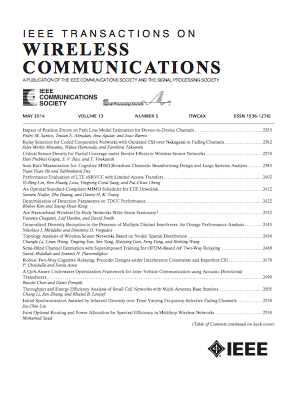Robust Full-Space Physical Layer Security for STAR-RIS-Aided Wireless Networks: Eavesdropper With Uncertain Location and Channel
IF 10.7
1区 计算机科学
Q1 ENGINEERING, ELECTRICAL & ELECTRONIC
引用次数: 0
Abstract
A robust full-space physical layer security (PLS) transmission scheme is proposed in this paper considering the full-space wiretapping challenge of wireless networks supported by simultaneous transmitting and reflecting reconfigurable intelligent surface (STAR-RIS). Different from the existing schemes, the proposed PLS scheme takes account of the uncertainty on the eavesdropper’s position within the 360° service area offered by the STAR-RIS. Specifically, the large system analytical method is utilized to derive the asymptotic expression of the average security rate achieved by the security user, considering that the base station (BS) only has the statistical information of the eavesdropper’s channel state information (CSI) and the uncertainty of its location. To evaluate the effectiveness of the proposed PLS scheme, we first formulate an optimization problem aimed at maximizing the weighted sum rate of the security user and the public user. This optimization is conducted under the power allocation constraint, and some practical limitations for STAR-RIS implementation, through jointly designing the active and passive beamforming variables. A novel iterative algorithm based on the minimum mean-square error (MMSE) and cross-entropy optimization (CEO) methods is proposed to effectively address the established non-convex optimization problem with discrete variables. Simulation results indicate that the proposed robust PLS scheme can effectively mitigate the information leakage across the entire coverage area of the STAR-RIS-assisted system, leading to superior performance gain when compared to benchmark schemes encompassing traditional RIS-aided scheme.star - ris辅助无线网络的鲁棒全空间物理层安全:位置和信道不确定的窃听器
针对同时发射和反射可重构智能面(STAR-RIS)支持的无线网络的全空间窃听挑战,提出了一种鲁棒的全空间物理层安全传输方案。与现有方案不同,本文提出的PLS方案考虑了窃听者在STAR-RIS提供的360°服务范围内位置的不确定性。具体而言,考虑到基站(BS)仅具有窃听者信道状态信息(CSI)的统计信息及其位置的不确定性,利用大系统分析法推导出安全用户平均安全率的渐近表达式。为了评估所提出的PLS方案的有效性,我们首先制定了一个优化问题,旨在最大化安全用户和公共用户的加权和率。通过联合设计主动式和被动式波束形成变量,在功率分配约束和STAR-RIS实现的一些实际限制下进行了优化。提出了一种基于最小均方误差(MMSE)和交叉熵优化(CEO)方法的迭代算法,有效地解决了离散变量非凸优化问题。仿真结果表明,所提出的鲁棒PLS方案可以有效地缓解star - ris辅助系统整个覆盖区域的信息泄漏,与包含传统ris辅助方案的基准方案相比,具有更高的性能增益。
本文章由计算机程序翻译,如有差异,请以英文原文为准。
求助全文
约1分钟内获得全文
求助全文
来源期刊
CiteScore
18.60
自引率
10.60%
发文量
708
审稿时长
5.6 months
期刊介绍:
The IEEE Transactions on Wireless Communications is a prestigious publication that showcases cutting-edge advancements in wireless communications. It welcomes both theoretical and practical contributions in various areas. The scope of the Transactions encompasses a wide range of topics, including modulation and coding, detection and estimation, propagation and channel characterization, and diversity techniques. The journal also emphasizes the physical and link layer communication aspects of network architectures and protocols.
The journal is open to papers on specific topics or non-traditional topics related to specific application areas. This includes simulation tools and methodologies, orthogonal frequency division multiplexing, MIMO systems, and wireless over optical technologies.
Overall, the IEEE Transactions on Wireless Communications serves as a platform for high-quality manuscripts that push the boundaries of wireless communications and contribute to advancements in the field.

 求助内容:
求助内容: 应助结果提醒方式:
应助结果提醒方式:


